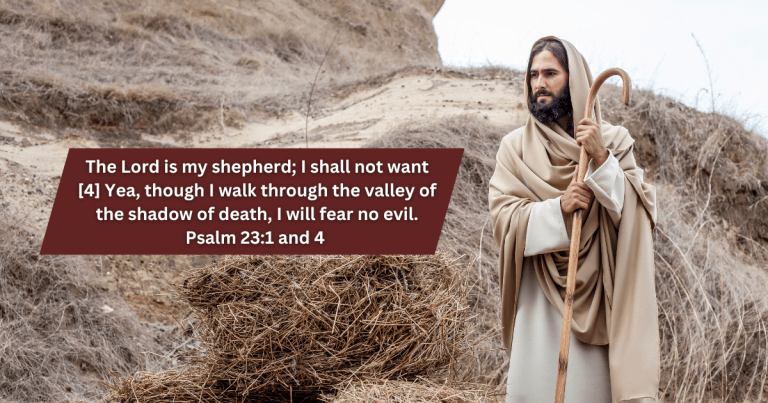Over time, familiarity with a Scripture passage can cause us to miss its deeper truths and blessings. Many of us grew up reciting the well-known Psalm 23, “The Lord is my Shepherd,” so often that its profound meaning may have been lost to some.
But today, I invite you to pause and reflect on this Psalm with fresh perspective and let it truly bless you.
Let’s see it through the eyes of the author—feel his pain, frustration, joy, dependence, solitude, and surrender to God. My prayer is that by the end of this reflection, you’ll develop a deeper appreciation for this psalm of surrender and connect with it more intimately. I pray that you will come to see God as the One who guides you with both His rod and His staff because He cares deeply for you.
The Lord is My Shepherd
Think of it as: The Lord is my guide, my protector, my provider—my all-sufficiency.
I shall not want
Because I have the Lord as my Shepherd, I will lack nothing.
As long as the Shepherd is present, the sheep have no fear about where their next meal will come from. The Shepherd takes full responsibility for guiding them to food and shelter. The sheep need only to follow His lead; He does the thinking for them.
One of the many songs my husband has gifted to the world is the one that says:
“I will follow You as You’re leading
follow You as You’re moving
flying as You’re flying
soaring as You’re soaring
every day, every moment,
cause we trust You.”
This heartfelt song of surrender has been a source of deep comfort to me, particularly during times of uncertainty and weariness.
I encourage you to search for this song on YouTube and let its message bless and inspire you.
He Makes Me Lie Down in Green Pastures, He Leads Me Beside Still Waters
He makes me lie down in comfort and provides all the stability I need. He guides me into calm and rest.
to me, the still waters symbolize peace, where we can drink deeply and be refreshed-rest for the soul in times of weariness.
The green pastures represent the abundance He provides.
He Restores My Soul, He Leads Me in the Paths of Righteousness
When my soul is thirsty, unstable, or weary, when I’ve wandered off course, His rod gently restores me to righteousness. God doesn’t let His sheep stray without bringing them back. He leaves the 99 to find the one lost sheep, demonstrating His deep commitment to His people. (John 6:39, John 17:12)
For His Name’s Sake
He does this not because I deserve it, but for the sake of His own name. It’s a matter of His integrity and faithfulness. His name and His Word are of more value to Him than His desire for justice or retribution. His faithfulness to us reflects His character—He cannot fail.
Though I Walk Through the Valley of the Shadow of Death, I Will Fear No Evil; For You are with me;
Being a child of God does not exempt us from trials.
Psalm 11:5 reminds us that “The LORD tests the righteous.”
However, in our darkest valleys, in seasons of testing that shake the very foundations of our faith, we can rest in the peace of knowing that God is with us. Therefore, we need not fear any evil.
Your rod and your staff, they comfort me.
What do the rod and staff mean to you?
In Scripture, we see that the shepherd’s rod and staff serve as symbols of discipline, authority, and leadership.
Proverbs 3:12 says, “A father corrects the son he loves.” This means discipline isn’t something to fear but to embrace, for it is a mark of God’s love for us.
With the rod and staff, the shepherd protects his flock, corrects, defends against wild animals and threats, keeps the sheep in line, and guides them to safety and sustenance. The staff has a curved shape that allows the shepherd to use the tip to rescue a sheep from a crevice or hole.
Moses, too, used a staff as a symbol of both his authority and God’s power. This staff was not merely a tool for guiding his sheep and leading God’s people, but a visible sign of God’s presence and sovereign authority.
Do not despise God’s Discipline
Proverbs 3:11-12 says, “My son, do not despise the Lord’s discipline, and do not resent His rebuke, because the Lord disciplines those He loves, as a father the son He delights in.”
Likewise, in Job 5:17–18, we read, “Blessed is the one whom God corrects; so do not despise the discipline of the Almighty. For He wounds, but He also binds up; He injures, but His hands also heal.”
Revelation 3:19 tells us, “Those whom I love I rebuke and discipline. So be earnest and repent.”
Hebrews 12:5-6 echoes this, “Do not despise the chastening of the Lord, nor be discouraged when you are rebuked by Him; for whom the Lord loves He chastens, and scourges every son whom He receives.”
It is Better to be Chastened by God
David, as a shepherd, understood that it is better to be chastened by the Lord than by the world. When confronted with the guilt of conducting a census without God’s permission, David was presented with three potential consequences, which can be summarized as: falling into the hands of men, or falling into the hands of God. Wisely, he chose to fall into God’s hands.
David knew the depth of God’s mercy—how His love was unshakable and trustworthy. He relied on God’s sure mercies, confident that a broken and contrite heart would never be forsaken by Him.
The Shepherd Provides Comfort and Stability
The presence of the Shepherd brings comfort, security, and a sense of stability to the sheep. The shepherd is the one who ensures they are safe and cared for. Scripture reminds us that, “Strike the shepherd, and the sheep will scatter.” (Mark 14:27) But our Shepherd, Jesus, can never be struck. He is jealous for us, protecting us with an unshakable love and passion.
As a shepherd himself, David could relate to the sense of security his sheep felt under his care, and he saw that same safety in his relationship with God as his Shepherd.
Recall David’s speech to Saul when he persuaded him to let him face the Philistine giant, Goliath: “Your servant has been keeping his father’s sheep. When a lion or a bear came and carried off a sheep from the flock, I went after it, struck it, and rescued the sheep from its mouth. When it turned on me, I seized it by its hair, struck it, and killed it. Your servant has killed both the lion and the bear; this uncircumcised Philistine will be like one of them, because he has defied the armies of the living God.”
He prepares a table before me, in the presence of my enemies.
How often have we wished for the downfall of those who oppose us? Prayed for them to be defeated, even wiped out? Yet, I’ve often thought that it may be more powerful to pray for the salvation of their souls. Of course, there are some whose hearts are too hardened to repent.
But then I reflect—how much more glorious is it when God chooses to bless us right in front of those who have despised, ridiculed, or doubted us? That, in itself, is a testament to God’s grace and power that He can bless us even in the midst of opposition.
He Anoints My Head with Oil, My Cup Overflows, surely, goodness and mercy shall follow me, and I will dwell in the house of the Lord forever.
David meditates on God’s goodness and concludes that surely, without a doubt, if God is all these things to him, then goodness and mercy will follow him all the days of his life.
Where better to dwell than in the house of the Shepherd—the place of safety, provision, and peace?
The Lord is my Shepherd.
Key Scriptures to study2 Samuel 24, Psalm 23, John 10:11-15






